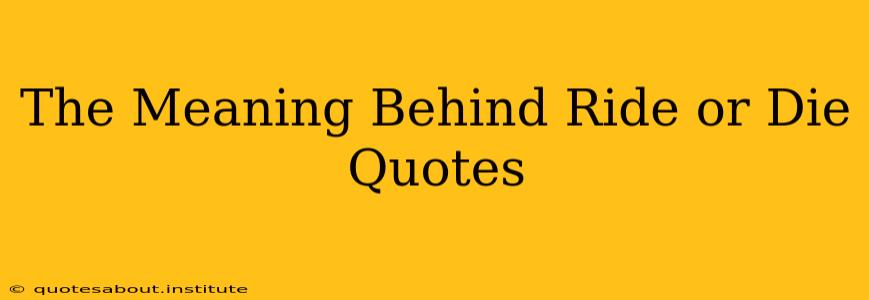The phrase "ride or die" evokes a powerful image: unwavering loyalty, steadfast commitment, and a willingness to face any challenge, hand-in-hand with someone you trust implicitly. But what does it really mean? This phrase, born from hip-hop culture and popularized through social media, represents a deep and complex relationship dynamic that goes beyond simple friendship. Let's delve into the meaning behind these often-used quotes and explore the nuances of this powerful expression.
What Does "Ride or Die" Actually Mean?
At its core, "ride or die" signifies unwavering loyalty and support, regardless of the circumstances. It implies a commitment to stand by someone, thick and thin, through triumphs and tribulations. The "ride" metaphor suggests navigating life's journey together, facing obstacles and challenges as a united front. The "die" component underscores the gravity of this commitment – a willingness to face significant risks and sacrifices for the sake of the relationship.
This commitment isn't limited to casual acquaintances; it’s typically reserved for close friends, family members, or romantic partners who have proven their worthiness of such profound dedication. It's about having someone's back, no matter what – even if it means facing danger or personal sacrifice.
What are Some Examples of "Ride or Die" Relationships?
Examples of "ride or die" relationships often involve individuals who:
- Have overcome significant adversity together: Shared experiences of hardship can forge exceptionally strong bonds, proving the depth of loyalty and commitment.
- Support each other's dreams and ambitions: True "ride or die" relationships involve mutual support and encouragement, fostering each other's personal and professional growth.
- Prioritize each other's well-being above all else: This prioritization demonstrates a selfless commitment, putting the needs of the other person ahead of personal gain or convenience.
- Have demonstrated consistent reliability and trustworthiness: This unwavering support and dependable nature forms the bedrock of any "ride or die" relationship.
What are the Downsides of a "Ride or Die" Mentality?
While the concept of unwavering loyalty is admirable, a "ride or die" mentality can have downsides:
- Enabling negative behavior: Blind loyalty can lead to enabling destructive behaviors, hindering personal growth and well-being for one or both individuals.
- Compromising personal values: The pressure to support someone unconditionally, regardless of their actions, can force individuals to compromise their own principles.
- Lack of healthy boundaries: A "ride or die" relationship without healthy boundaries can lead to codependency and hinder individual autonomy.
Is "Ride or Die" Always Positive?
The connotation of "ride or die" can be positive or negative depending on the context. While it often signifies unwavering support and loyalty, it can also be associated with:
- Gang culture: In some subcultures, the phrase carries a more aggressive connotation, implying a willingness to engage in risky or illegal activities for the sake of loyalty.
- Toxic relationships: In unhealthy relationships, a "ride or die" mentality can lead to enabling harmful behaviors and preventing individuals from seeking help or leaving toxic situations.
Therefore, it's crucial to assess the context in which the phrase is used to fully understand its intended meaning.
What are other ways to express unwavering loyalty?
While "ride or die" is a powerful expression, other phrases can convey unwavering loyalty without the potential negative connotations:
- Thick and thin: This classic phrase implies support through all circumstances.
- Through and through: This emphasizes the depth and completeness of the loyalty.
- Unwavering support: This clearly communicates a steadfast commitment.
- My rock: This metaphor illustrates the person's dependable and supportive nature.
Ultimately, the choice of phrase depends on the specific context and desired tone.
Conclusion: Understanding the Nuances of "Ride or Die"
The phrase "ride or die" captures a powerful ideal of loyalty and commitment. However, its meaning is nuanced and depends heavily on the context. Understanding the potential downsides and alternative ways to express unwavering loyalty is crucial to avoid the pitfalls of blindly following a "ride or die" mentality without healthy boundaries and critical self-reflection. The true essence of strong relationships lies in a balance of loyalty, support, and healthy boundaries that allow for both individual growth and enduring bonds.

